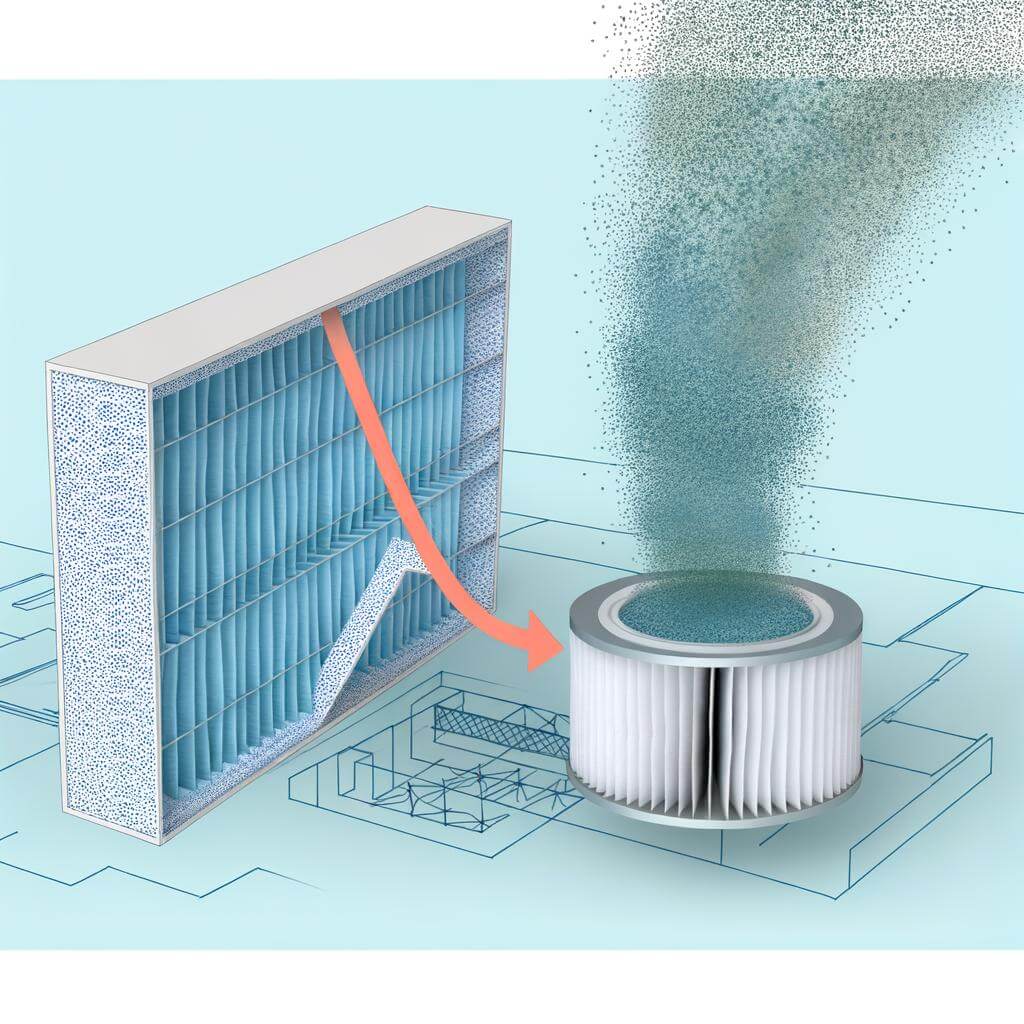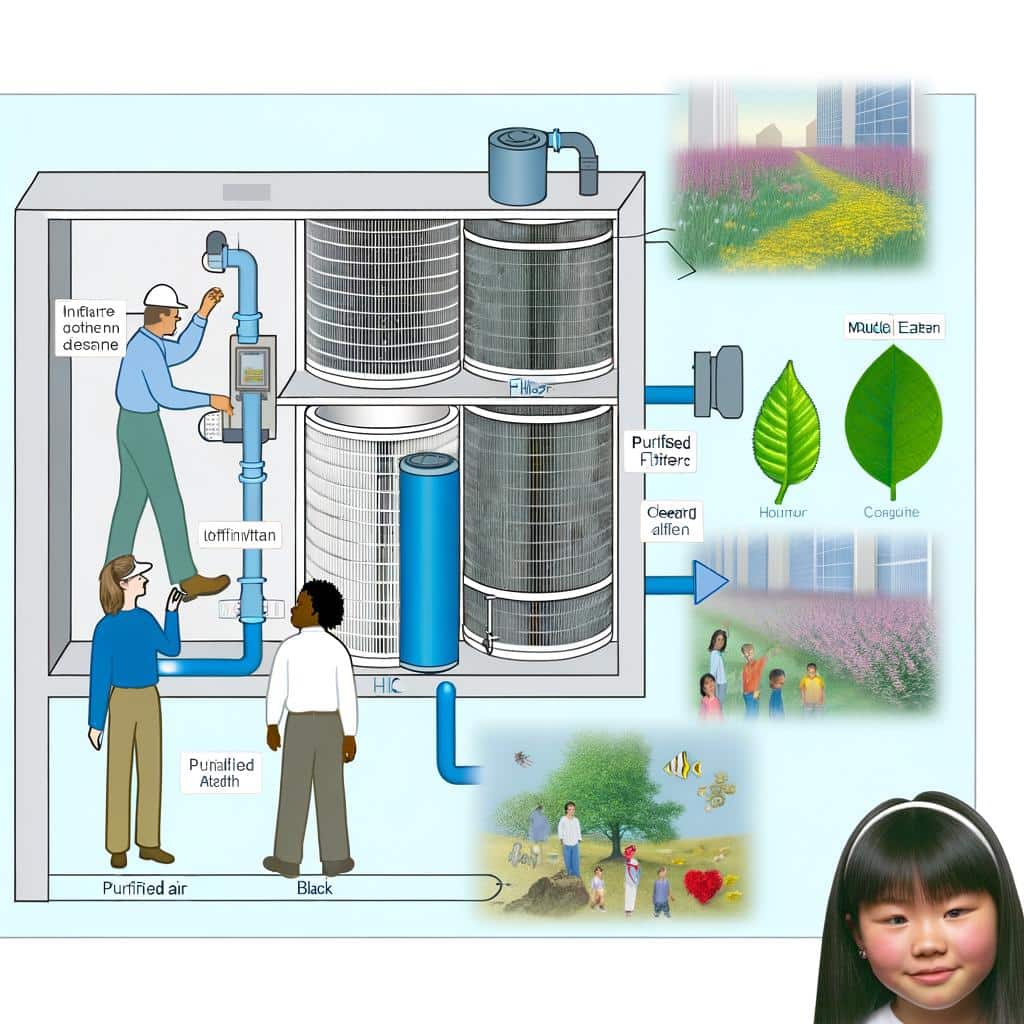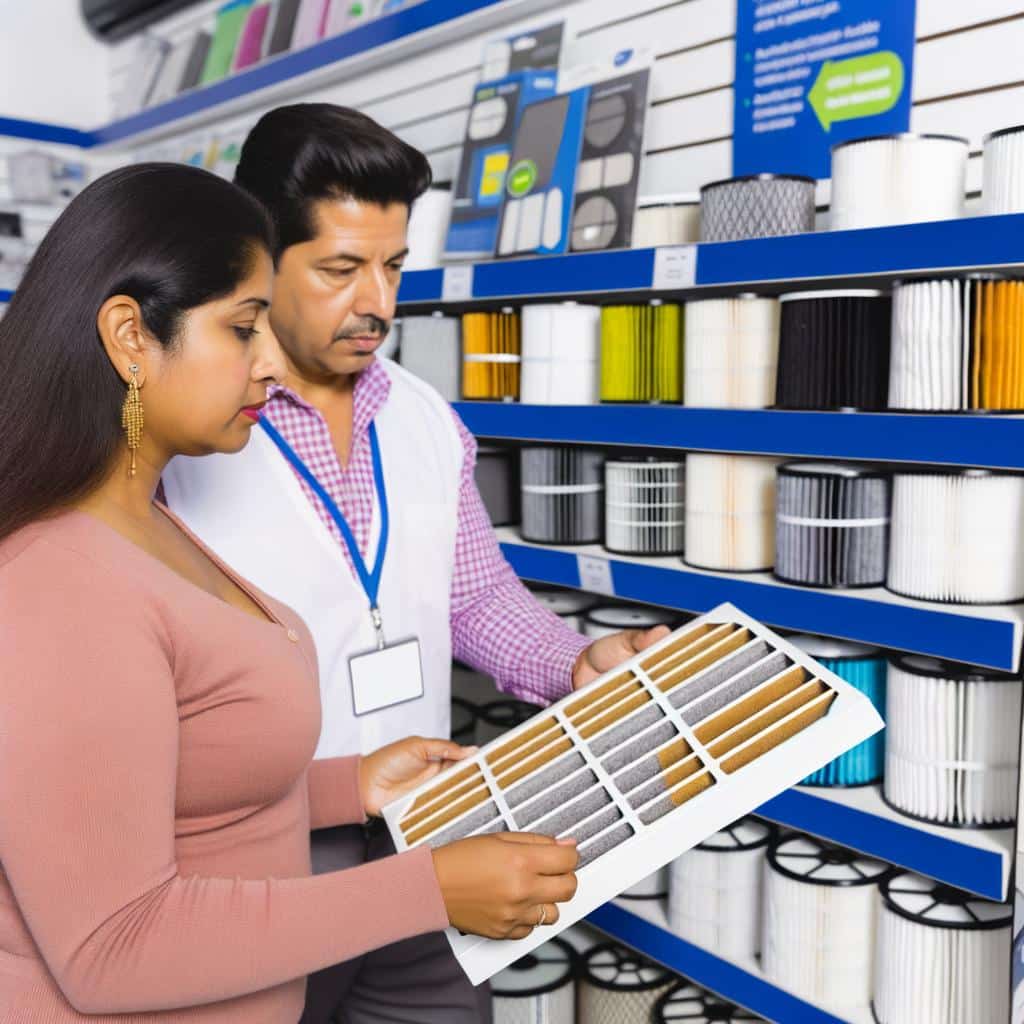As one inhales a lungful of clean, refreshing air in the comfort of home, few might spare a thought for the complex machinery working tirelessly to create that perfect environment. One such component, often overlooked yet critically essential, is the humble HVAC air filter. Nestled within climate control systems, these unsung heroes tirelessly cleanse the air we breathe, ensuring particles, pollutants and allergens don’t end up invading our living space, and ultimately, our bodies. So, let’s embark on a fascinating journey, as we pull back the curtain on these hidden guardians and explore the compelling history and indispensable purpose of HVAC air filters. Breathe easy, dear reader, and let’s delve into the unseen world of these amazing contraptions. Let’s appreciate these silent sentinels that shield us from the unseen, every minute, every day.
The Fascinating History of HVAC Air Filters
The genesis of HVAC air filters dates back to the early 19th century when the initial need to filter air was identified. Post the industrial revolution, numerous factories started spewing smoke and debris in the air which was a health hazard. Consequently, the burgeoning need for a cleaner environment led to the advent of air filters. The first of its kind was an easily removable cloth-cover used to trap airborne dust and grit. However, these were quite simplistic as compared to today’s advanced air filters and their chief role was to guard the machinery from the particulates rather than aiming for air purification.
By the mid-20th century, advancements had directed a shift of focus from simply protecting machinery to patronizing the health benefits of purified air. During the Second World War, the Atomic Energy Commission created the first High Efficiency Particulate Air (HEPA) filter to hinder the spreading of radioactive dust particles. This was a turning point not just because it featured a filtration technology with an efficiency of 99.97% at 0.3 microns, but also due to its application-orientated design. Post-war, these HEPA filters were commercialized and incorporated into HVAC systems ushering an era of high-quality indoor air. Modern-day HVAC air filters have evolved but the primary aim of curating a healthier environment remains unaltered.
| Type | Introduced | Purpose |
|---|---|---|
| Cloth-Cover Filters | Early 19th century | Guard Machinery |
| HEPA Filters | Mid 20th century | Air Purification |
- Evolving Purposes: Initially air filters were designed to protect machinery, however, the focus gradually shifted to human health and improvement of indoor air quality.
- Technological Advancements: Air filters have come a long way since the primitive cloth-cover versions. The invention of HEPA filters during WWII marked a significant leap in the air filter technologies.
- Environmental Consciousness: With rising awareness about environmental wellness, the demand for efficient air filters continues to see an upsurge. The future holds promise for more innovative and eco-friendly filtering options.

Understanding the Core Purpose of HVAC Air Filters
For many homeowners, the humble air filter is a part of their HVAC system they hardly give a second thought. However, behind its simple exterior lies a rich history and a critical job to perform. The invention of air filters traces its origins back to the era of Industrial Revolution. High levels of pollution needed to be tackled, leading to the creation of simple HVAC air filters. Today, they have evolved into sophisticated devices that not only keep dust and allergens at bay, but also contribute significantly to maintaining indoor air quality for a healthier living environment.
- Protecting Equipment: The primary purpose of HVAC air filters is to prevent dust, dirt and other particles from entering your heating, ventilation and air conditioning system. A buildup of such contaminants can hinder your HVAC unit’s performance, leading to inefficiency and potential damage. A clean air filter ensures your system runs smoothly, minimizing unnecessary repairs and reducing energy bills.
- Maintaining Indoor Air Quality: Aside from safeguarding your HVAC system, air filters play a pivotal role in preserving indoor air quality. They trap harmful particulates, such as pollen, mold spores and dust mites – all significant contributors to allergies and respiratory issues. Therefore, regularly changing your air filters is not just good practice for system maintenance, but it’s also essential for your health.
| Type of Filter | Typical Lifespan | Effectiveness |
|---|---|---|
| Fiberglass | 30 days | Less effective at filtering small particles |
| Pleated | 90 days | More effective at filtering small particles |
| HEPA | 6-12 months | Most effective at filtering almost all particles |
In conclusion, HVAC air filters may look inconspicuous, but their contribution towards keeping your home comfortable and your air clean is colossal. By understanding their purpose and history, one can appreciate their crucial role in our everyday living. So, remember the oft-neglected air filter next time you breathe in clean, comfortable air at home.
How HVAC Air Filters Benefit You and Your Environment
The sleek engineering and unseen workings of your HVAC system may be intriguing, but the unassuming air filter is a silent hero working tirelessly to improve your home’s air quality. By trapping a variety of airborne particles ranging from dust, pollen, mold spores, to bacteria, they help maintain your respiratory health and the longevity of your HVAC system. The air filter, therefore, deserves accolades for keeping your environment fresh and your households breathing easy.
Stepping into the history of air filters, they were initially designed to protect the intricate machinery of HVAC systems. However, they have evolved over time, with their purpose now well beyond the realm of merely equipment protection. They’ve increasingly become our first line of defense against various allergens and contaminants. Take a look at some significant benefits provided by HVAC air filters:
- Diminished allergens: By capturing particles like pollen and dust mites, air filters help to lessen allergens in the home. This is particularly beneficial for individuals with allergies or asthma.
- Mold prevention: By trapping mold spores, the air filters prevent them from circulating, thus helping to prevent mold growth in your environment.
- Healthy lungs: As they trap particulates and potential carcinogens like cigarette smoke, they help safeguard your lungs from these harmful substances.
| Levels of Filter Efficiency | Particle Size Trapped |
|---|---|
| Low Efficiency | Larger particles (Dust, lint, fibers) |
| Medium Efficiency | Smaller particles (Mold spores, dust mite debris) |
| High Efficiency | Tiny particles (Bacteria, tobacco smoke) |
Beyond improving individual health, the use of air filters contributes to environmental well-being as well. By maintaining cleaner air, reducing energy consumption, and lessening the necessity of HVAC repairs (which can cause further pollution), air filters are an essential element of sustainable living practices.

Unraveling the Science Behind Air Filters in HVAC Systems
In the perpetual efforts to achieve optimal indoor air quality, the air filter plays a pivotal role within an HVAC system. Existing primarily to filter out particles and dust from the air, the humble air filter has evolved significantly over the years to provide enhanced functionality and adaptability. Understanding the science behind these essential components allows us to make informed choices for our own homes and offices, achieving cleaner air and improving our overall health. Air filters in HVAC systems are primarily tasked with keeping the system clean and operating efficiently. They accomplish this by catching airborne particles including dust, dirt, and other allergens before they can enter the system. A high-quality air filter will be able to catch a larger percentage of particles, but this also depends on the mechanical structural design of the filter. The efficiency of a filter is usually measured in Minimum Efficiency Reporting Values (MERV), with higher values indicating better filtration capabilities.
| MERV Ratings | Types of Particles Filtered |
|---|---|
| 1-4 | Pollen, dust mites, sanding dust, carpet fibers |
| 5-8 | Mold spores, hair spray, fabric protector, cement dust |
| 9-12 | Lead dust, milled flour, auto emissions, welding fumes |
| 13-16 | Bacteria, tobacco smoke, sneeze, cooking oil |
In addition to improving air quality, having a clean and efficient air filter is crucial in prolonging the lifespan of your HVAC system. When filters are left unchanged, the increase in particles can cause the system to work harder, leading to higher energy usage and potential damage over time. Thus, regularly changing air filters is a simple yet effective way to maintain your HVAC system.
Making the Right HVAC Air Filter Choice for Your Home
The inception of HVAC air filters can be traced back to the Industrial Revolution, a period that notoriously deteriorated the quality of air due to rampant pollution. Fast-forward a couple of centuries, HVAC air filters have become a household necessity, aiding in the eradication of airborne pollutants from our homes. By trapping and holding various types of particulate matter, they serve an essential health purpose. Introductory filters are designed to manage large particles like dust, lint, and fibers, while advanced filters can handle smaller pollutants, including viruses, bacteria, and various allergens.
Apart from safeguarding our health, HVAC air filters also protect our heating and cooling systems. Without them, the system components can become clogged or damaged, leading to compromised performance or even breakdowns. Making the right choice entails understanding the variety on offer. There are Fiberglass filters, Pleated filters, and High-Efficiency Particulate Air (HEPA) filters just to name a few.
| Filter Type | Particle Size | Typical Uses |
|---|---|---|
| Fiberglass | Large | Common household dust, lint |
| Pleated | Medium to small | Pollen, mold spores, pet dander |
| HEPA | Tiny | Bacteria, viruses, tobacco smoke |
All the filters have their unique strengths, and understanding them will support you in making an informed decision. Key considerations include cost, required maintenance, and efficiency. Selection should ultimately be based on the specific needs of your household.

Maintenance Tips and Hacks for Your HVAC Air Filter
Taking care of your HVAC air filters is no Herculean task. In fact, with the right maintenance tips, the lifespan of your filters can be extended, thereby ensuring you breathe clean air year-round. First things first, regular check-ups are a must. Keep a close eye on your air filters and make it a point to check at least once a month to assess its condition. During periods of high usage, especially the scorching summer months or the biting winters, you might have to up the frequency of your inspection. Secondly, a routine replacement schedule is crucial in preserving the efficacy of your air filters. Here’s a simple rule of thumb you can follow. If the filter looks clogged and it’s difficult to see through it, it’s time to toss it out. Generally, this has to be done every 90 days, but if you have pets, you might want to replace it more frequently. This maintenance schedule might vary depending on various factors. Below is a handy table for your reference.
| Type of Residence | Suggested Maintenance Frequency |
|---|---|
| Average suburban home with no pets | Every 90 days |
| Average suburban home with one pet | Every 60 days |
| Home in a busy metropolitan area or with multiple pets | Every 30 days |
| Home with a family member that has allergies | Every 20 – 45 days |
Finally, consider upgrading your air filter. If you’re currently using a fiberglass filter, it might be worth upgrading to a pleated or electrostatic filter. Although a tad more expensive, these provide a higher level of filtration, catching smaller particles, and are more durable as well. Remember, investing in the best air filter is an investment in your health, comfort, and well-being. As we draw the veil back on, we now peer at the world of HVAC air filters with new insight. The humble birth from coal-heated homes through rampant progression into the tapped veins of our daily lives. Their silent watch, removing particles unseen by the naked eye, so our breath can dance freely, unburdened by disease and discomfort. Recall their past, recognize their purpose, and respect their presence; for these technological sentinels are often forgotten, yet fundamental. Now, each time you revel in the warmth of your hearth, or the cool breeze in a sultry summer, remember this unseen hero, your HVAC air filter, and rightly so – breathe easy.




